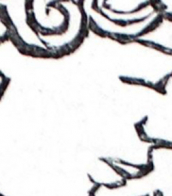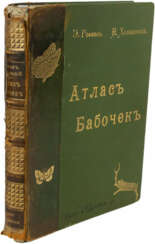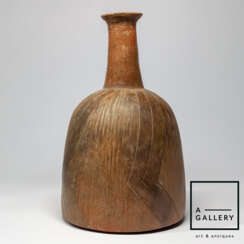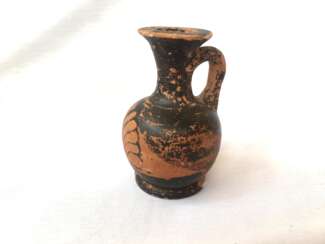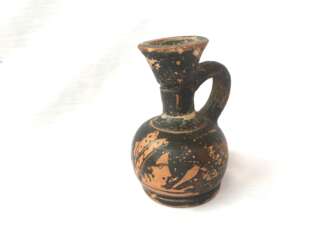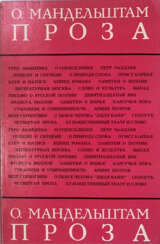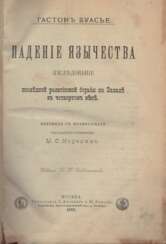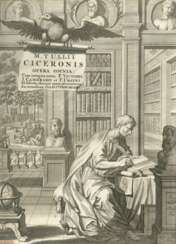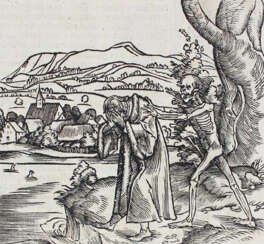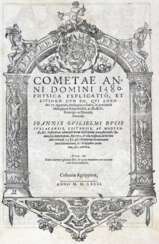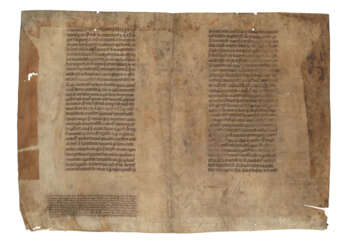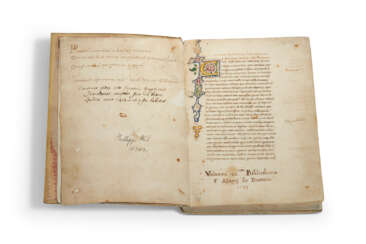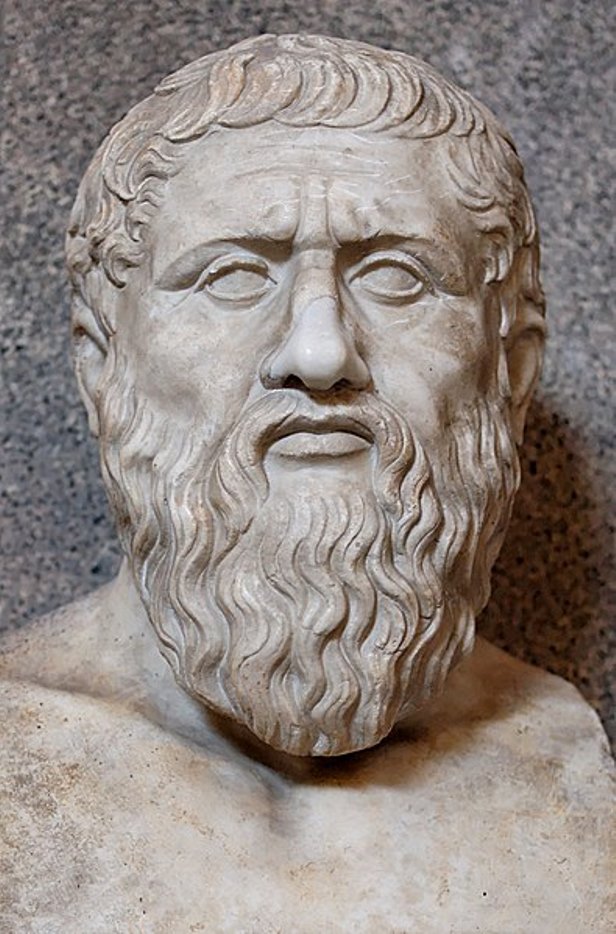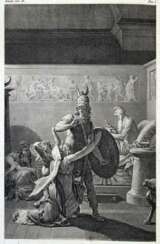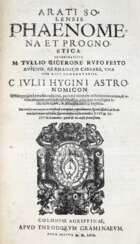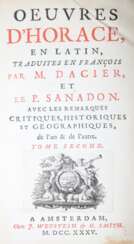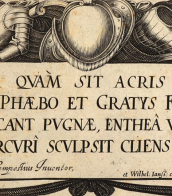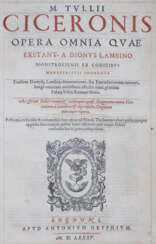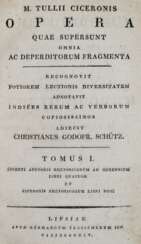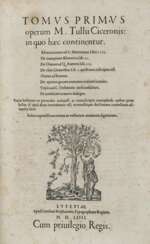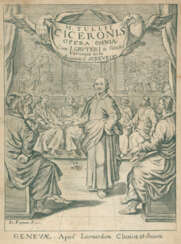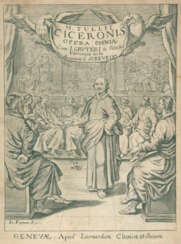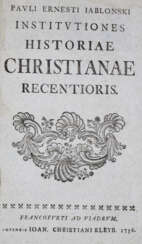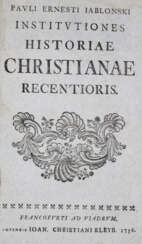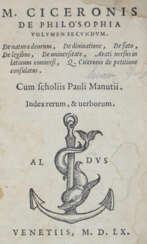4 э

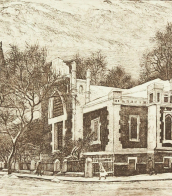
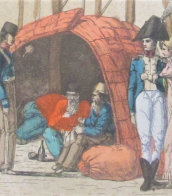


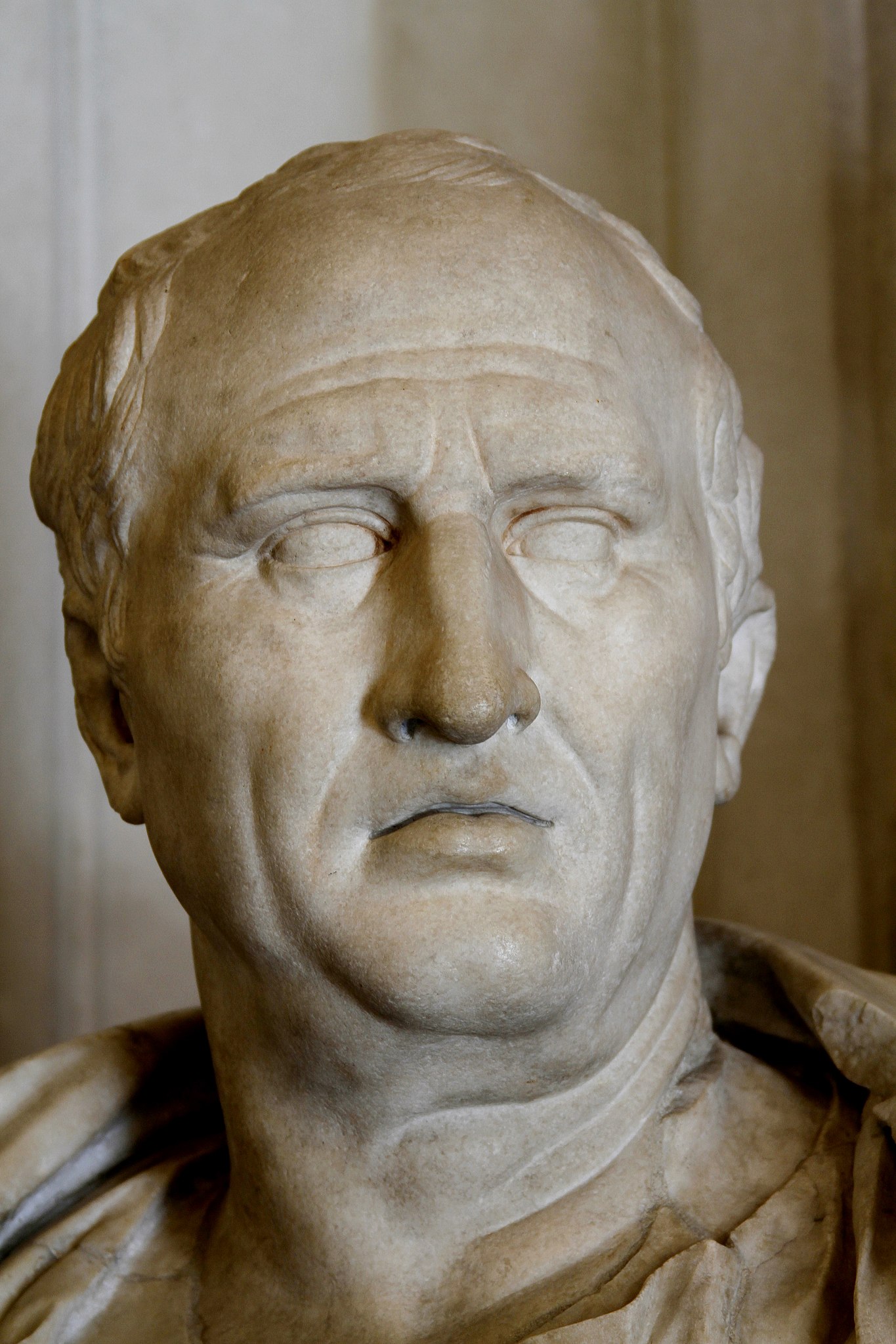
Marcus Tullius Cicero was a Roman statesman, lawyer, scholar, philosopher, and academic skeptic, who tried to uphold optimate principles during the political crises that led to the establishment of the Roman Empire. His extensive writings include treatises on rhetoric, philosophy and politics. He is considered one of Rome's greatest orators and prose stylists. He came from a wealthy municipal family of the Roman equestrian order, and served as consul in 63 BC.
His influence on the Latin language was immense. He wrote more than three-quarters of extant Latin literature that is known to have existed in his lifetime, and it has been said that subsequent prose was either a reaction against or a return to his style, not only in Latin but in European languages up to the 19th century. Cicero introduced into Latin the arguments of the chief schools of Hellenistic philosophy and created a Latin philosophical vocabulary with neologisms such as evidentia, humanitas, qualitas, quantitas, and essentia, distinguishing himself as a translator and philosopher.
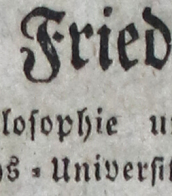

Marcus Tullius Cicero was a Roman statesman, lawyer, scholar, philosopher, and academic skeptic, who tried to uphold optimate principles during the political crises that led to the establishment of the Roman Empire. His extensive writings include treatises on rhetoric, philosophy and politics. He is considered one of Rome's greatest orators and prose stylists. He came from a wealthy municipal family of the Roman equestrian order, and served as consul in 63 BC.
His influence on the Latin language was immense. He wrote more than three-quarters of extant Latin literature that is known to have existed in his lifetime, and it has been said that subsequent prose was either a reaction against or a return to his style, not only in Latin but in European languages up to the 19th century. Cicero introduced into Latin the arguments of the chief schools of Hellenistic philosophy and created a Latin philosophical vocabulary with neologisms such as evidentia, humanitas, qualitas, quantitas, and essentia, distinguishing himself as a translator and philosopher.
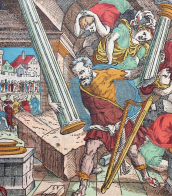
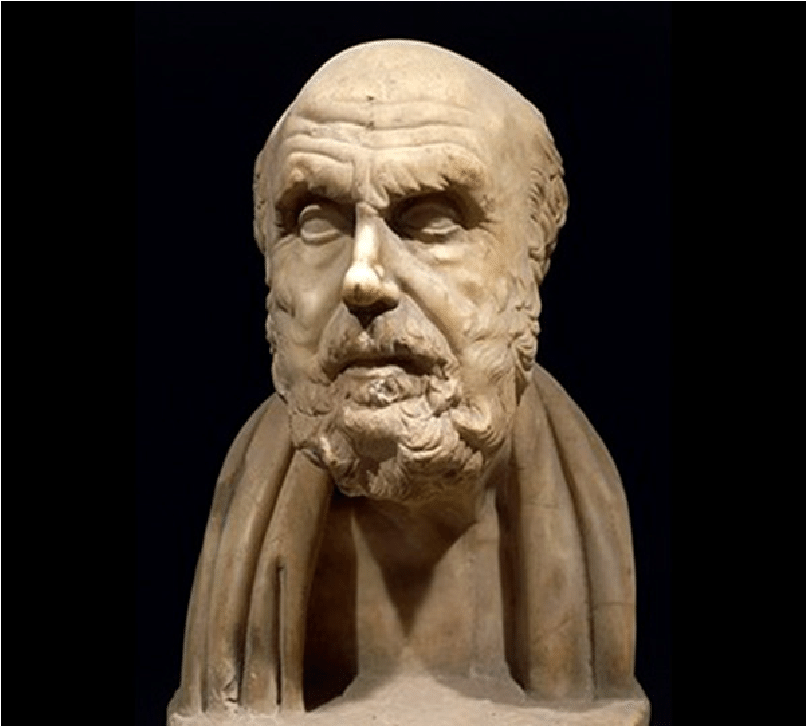
Aratus Solensis was an ancient Greek didactic poet.
It is known that he was a native of the ancient city of Soli in Cilicia, and studied under the famous philosophers of his time in Ephesus, Cos and Athens. Around 276 BC, Aratus was invited to the court of the Macedonian king Antigonus II Gonatus and expounded in verse his victory over the Gauls. Here he also wrote his most famous work in modern times, the hexameter poem Phenomena, which sets forth the astronomical knowledge of the time. He then spent some time at the court of Antiochus I Soter of Syria and returned to Macedonia.
The poet's second extant poem is Diosemeia ("On the Omens of the Weather"). These two poems by Aratus were very popular in both the Greek and Roman worlds. He was translated and quoted by Ovid and Cicerone, and a translation into Arabic was made in the 9th century.
In addition to poetry, Aratus practiced medicine, grammar, and philosophy.
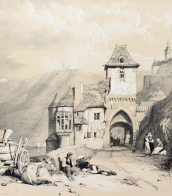
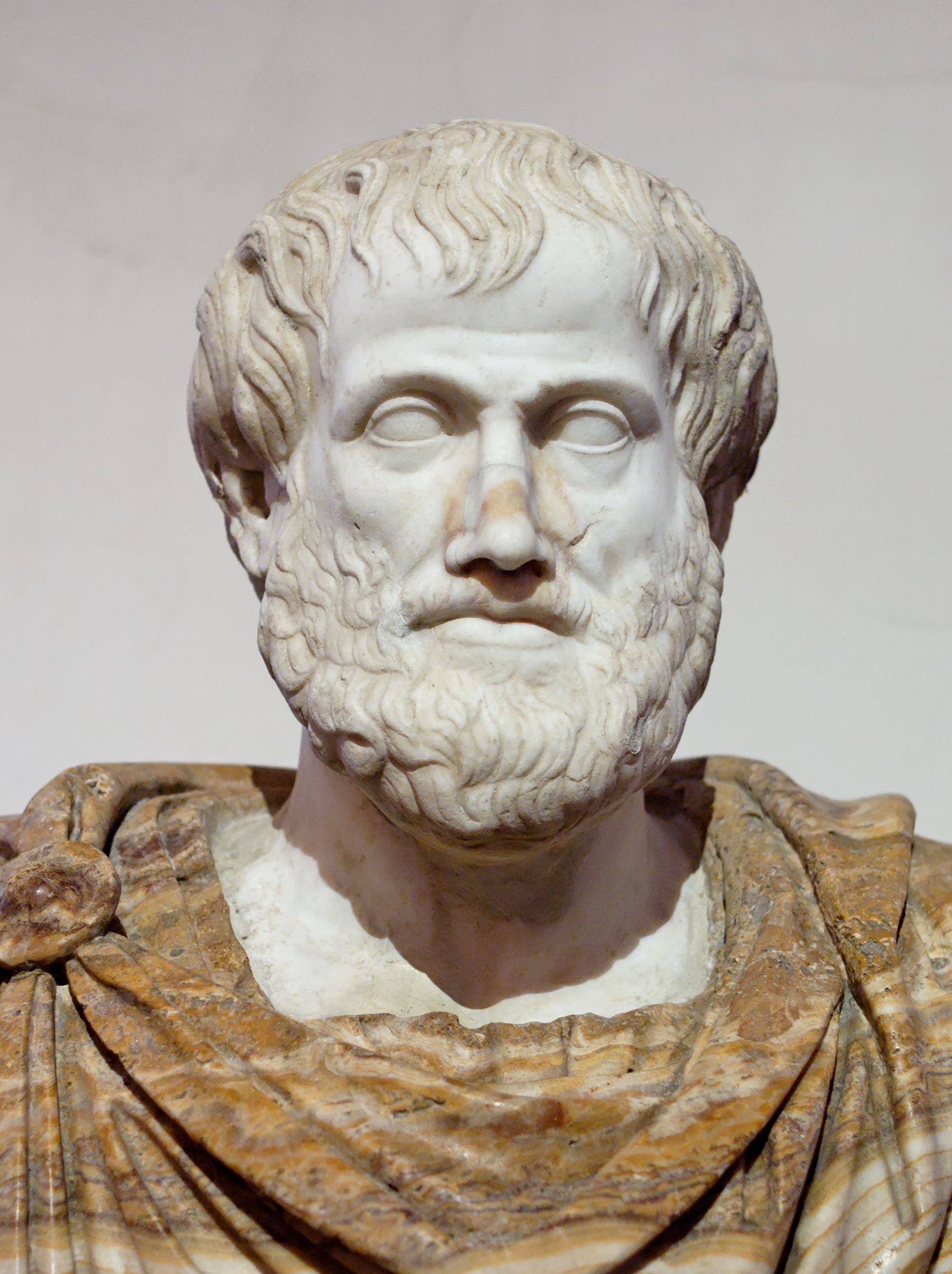
Aristotle (Greek: Ἀριστοτέλης) was an Ancient Greek philosopher and polymath, renowned for his profound impact on Western philosophy and science. Born in Stagira, Chalcidice, Aristotle's intellectual ventures spanned a multitude of subjects, including but not limited to physics, metaphysics, poetry, theater, music, logic, rhetoric, politics, government, ethics, biology, and zoology.
Educated in Plato's Academy in Athens, Aristotle distinguished himself as a scholar of vast knowledge and influence. His foundational works laid the groundwork for the development of modern science, while his teachings on logic and the syllogistic method continue to resonate in the realm of philosophy. As the tutor of Alexander the Great and the founder of the Lyceum in Athens, Aristotle's legacy extends beyond his prolific writings, with his teachings shaping medieval scholarship and influencing both Judeo-Islamic and Christian theologies.
Among Aristotle's notable works, his treatises such as "Nicomachean Ethics," "Politics," "Metaphysics," and "Poetics" have been studied for centuries. His concept of the "Golden Mean," advocating for a balanced and moderate approach to life, remains a cornerstone of ethical philosophy. His ideas on the "Prime Mover" and empirical evidence as a basis for understanding the world laid the foundation for scientific inquiry. Although only about a third of his original output has survived, Aristotle's contributions continue to be a subject of academic study and admiration.
For collectors and experts in art and antiques, the philosophical and scientific principles of Aristotle's works are not just historical artifacts but living ideas that continue to shape our understanding of the world and our place within it. His insights into the "good life" and the pursuit of happiness are as relevant today as they were in ancient Greece.
If you wish to stay informed about new product sales and auction events related to Aristotle, sign up for updates. This subscription is your gateway to the latest scholarly works, collections, and auctions connected to the great philosopher's legacy.
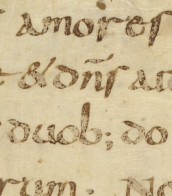

Marcus Tullius Cicero was a Roman statesman, lawyer, scholar, philosopher, and academic skeptic, who tried to uphold optimate principles during the political crises that led to the establishment of the Roman Empire. His extensive writings include treatises on rhetoric, philosophy and politics. He is considered one of Rome's greatest orators and prose stylists. He came from a wealthy municipal family of the Roman equestrian order, and served as consul in 63 BC.
His influence on the Latin language was immense. He wrote more than three-quarters of extant Latin literature that is known to have existed in his lifetime, and it has been said that subsequent prose was either a reaction against or a return to his style, not only in Latin but in European languages up to the 19th century. Cicero introduced into Latin the arguments of the chief schools of Hellenistic philosophy and created a Latin philosophical vocabulary with neologisms such as evidentia, humanitas, qualitas, quantitas, and essentia, distinguishing himself as a translator and philosopher.

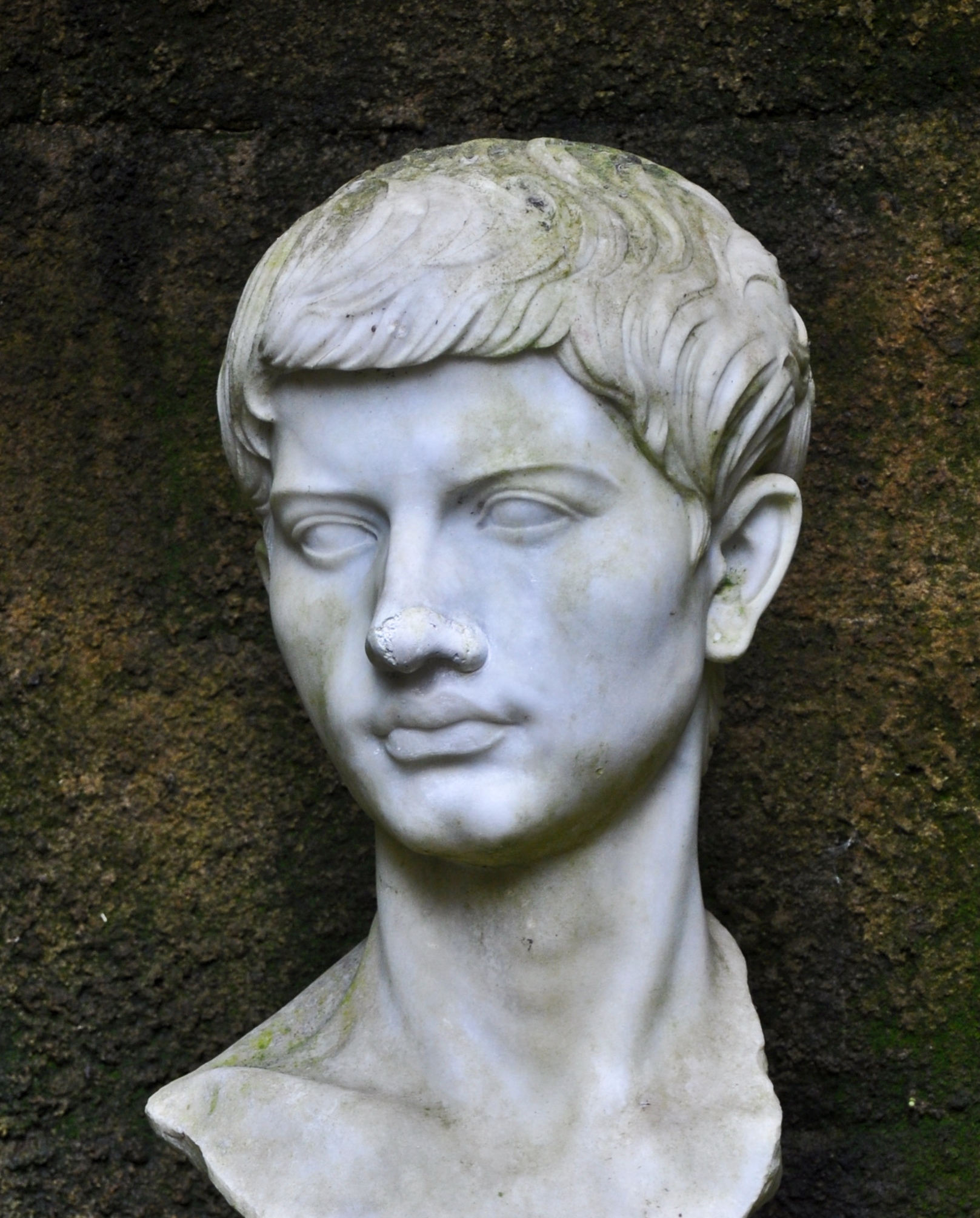
Publius Vergilius Maro, usually called Virgil or Vergil, was an ancient Roman poet of the Augustan period. He composed three of the most famous poems in Latin literature: the Eclogues (or Bucolics), the Georgics, and the epic Aeneid. A number of minor poems, collected in the Appendix Vergiliana, were attributed to him in ancient times, but modern scholars consider his authorship of these poems as dubious.
Virgil's work has had wide and deep influence on Western literature, most notably Dante's Divine Comedy, in which Virgil appears as the author's guide through Hell and Purgatory.
Virgil has been traditionally ranked as one of Rome's greatest poets. His Aeneid is also considered a national epic of ancient Rome, a title held since composition.
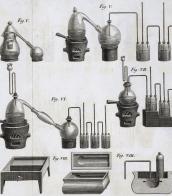

Aratus Solensis was an ancient Greek didactic poet.
It is known that he was a native of the ancient city of Soli in Cilicia, and studied under the famous philosophers of his time in Ephesus, Cos and Athens. Around 276 BC, Aratus was invited to the court of the Macedonian king Antigonus II Gonatus and expounded in verse his victory over the Gauls. Here he also wrote his most famous work in modern times, the hexameter poem Phenomena, which sets forth the astronomical knowledge of the time. He then spent some time at the court of Antiochus I Soter of Syria and returned to Macedonia.
The poet's second extant poem is Diosemeia ("On the Omens of the Weather"). These two poems by Aratus were very popular in both the Greek and Roman worlds. He was translated and quoted by Ovid and Cicerone, and a translation into Arabic was made in the 9th century.
In addition to poetry, Aratus practiced medicine, grammar, and philosophy.
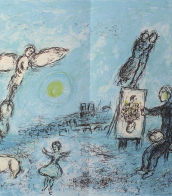

Marcus Tullius Cicero was a Roman statesman, lawyer, scholar, philosopher, and academic skeptic, who tried to uphold optimate principles during the political crises that led to the establishment of the Roman Empire. His extensive writings include treatises on rhetoric, philosophy and politics. He is considered one of Rome's greatest orators and prose stylists. He came from a wealthy municipal family of the Roman equestrian order, and served as consul in 63 BC.
His influence on the Latin language was immense. He wrote more than three-quarters of extant Latin literature that is known to have existed in his lifetime, and it has been said that subsequent prose was either a reaction against or a return to his style, not only in Latin but in European languages up to the 19th century. Cicero introduced into Latin the arguments of the chief schools of Hellenistic philosophy and created a Latin philosophical vocabulary with neologisms such as evidentia, humanitas, qualitas, quantitas, and essentia, distinguishing himself as a translator and philosopher.


Marcus Tullius Cicero was a Roman statesman, lawyer, scholar, philosopher, and academic skeptic, who tried to uphold optimate principles during the political crises that led to the establishment of the Roman Empire. His extensive writings include treatises on rhetoric, philosophy and politics. He is considered one of Rome's greatest orators and prose stylists. He came from a wealthy municipal family of the Roman equestrian order, and served as consul in 63 BC.
His influence on the Latin language was immense. He wrote more than three-quarters of extant Latin literature that is known to have existed in his lifetime, and it has been said that subsequent prose was either a reaction against or a return to his style, not only in Latin but in European languages up to the 19th century. Cicero introduced into Latin the arguments of the chief schools of Hellenistic philosophy and created a Latin philosophical vocabulary with neologisms such as evidentia, humanitas, qualitas, quantitas, and essentia, distinguishing himself as a translator and philosopher.
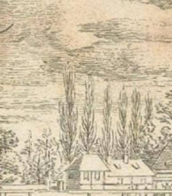

Marcus Tullius Cicero was a Roman statesman, lawyer, scholar, philosopher, and academic skeptic, who tried to uphold optimate principles during the political crises that led to the establishment of the Roman Empire. His extensive writings include treatises on rhetoric, philosophy and politics. He is considered one of Rome's greatest orators and prose stylists. He came from a wealthy municipal family of the Roman equestrian order, and served as consul in 63 BC.
His influence on the Latin language was immense. He wrote more than three-quarters of extant Latin literature that is known to have existed in his lifetime, and it has been said that subsequent prose was either a reaction against or a return to his style, not only in Latin but in European languages up to the 19th century. Cicero introduced into Latin the arguments of the chief schools of Hellenistic philosophy and created a Latin philosophical vocabulary with neologisms such as evidentia, humanitas, qualitas, quantitas, and essentia, distinguishing himself as a translator and philosopher.
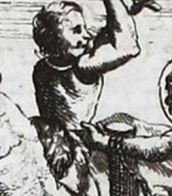

Euclid (Greek: Εὐκλείδης) was an ancient Greek mathematician active as a geometer and logician. Considered the "father of geometry", he is chiefly known for the Elements treatise, which established the foundations of geometry that largely dominated the field until the early 19th century. His system, now referred to as Euclidean geometry, involved new innovations in combination with a synthesis of theories from earlier Greek mathematicians, including Eudoxus of Cnidus, Hippocrates of Chios, Thales and Theaetetus. With Archimedes and Apollonius of Perga, Euclid is generally considered among the greatest mathematicians of antiquity, and one of the most influential in the history of mathematics.


Marcus Tullius Cicero was a Roman statesman, lawyer, scholar, philosopher, and academic skeptic, who tried to uphold optimate principles during the political crises that led to the establishment of the Roman Empire. His extensive writings include treatises on rhetoric, philosophy and politics. He is considered one of Rome's greatest orators and prose stylists. He came from a wealthy municipal family of the Roman equestrian order, and served as consul in 63 BC.
His influence on the Latin language was immense. He wrote more than three-quarters of extant Latin literature that is known to have existed in his lifetime, and it has been said that subsequent prose was either a reaction against or a return to his style, not only in Latin but in European languages up to the 19th century. Cicero introduced into Latin the arguments of the chief schools of Hellenistic philosophy and created a Latin philosophical vocabulary with neologisms such as evidentia, humanitas, qualitas, quantitas, and essentia, distinguishing himself as a translator and philosopher.
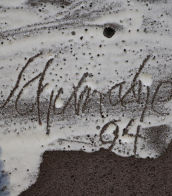

Marcus Tullius Cicero was a Roman statesman, lawyer, scholar, philosopher, and academic skeptic, who tried to uphold optimate principles during the political crises that led to the establishment of the Roman Empire. His extensive writings include treatises on rhetoric, philosophy and politics. He is considered one of Rome's greatest orators and prose stylists. He came from a wealthy municipal family of the Roman equestrian order, and served as consul in 63 BC.
His influence on the Latin language was immense. He wrote more than three-quarters of extant Latin literature that is known to have existed in his lifetime, and it has been said that subsequent prose was either a reaction against or a return to his style, not only in Latin but in European languages up to the 19th century. Cicero introduced into Latin the arguments of the chief schools of Hellenistic philosophy and created a Latin philosophical vocabulary with neologisms such as evidentia, humanitas, qualitas, quantitas, and essentia, distinguishing himself as a translator and philosopher.
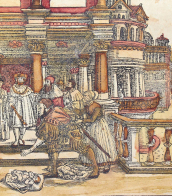

Marcus Tullius Cicero was a Roman statesman, lawyer, scholar, philosopher, and academic skeptic, who tried to uphold optimate principles during the political crises that led to the establishment of the Roman Empire. His extensive writings include treatises on rhetoric, philosophy and politics. He is considered one of Rome's greatest orators and prose stylists. He came from a wealthy municipal family of the Roman equestrian order, and served as consul in 63 BC.
His influence on the Latin language was immense. He wrote more than three-quarters of extant Latin literature that is known to have existed in his lifetime, and it has been said that subsequent prose was either a reaction against or a return to his style, not only in Latin but in European languages up to the 19th century. Cicero introduced into Latin the arguments of the chief schools of Hellenistic philosophy and created a Latin philosophical vocabulary with neologisms such as evidentia, humanitas, qualitas, quantitas, and essentia, distinguishing himself as a translator and philosopher.


Marcus Tullius Cicero was a Roman statesman, lawyer, scholar, philosopher, and academic skeptic, who tried to uphold optimate principles during the political crises that led to the establishment of the Roman Empire. His extensive writings include treatises on rhetoric, philosophy and politics. He is considered one of Rome's greatest orators and prose stylists. He came from a wealthy municipal family of the Roman equestrian order, and served as consul in 63 BC.
His influence on the Latin language was immense. He wrote more than three-quarters of extant Latin literature that is known to have existed in his lifetime, and it has been said that subsequent prose was either a reaction against or a return to his style, not only in Latin but in European languages up to the 19th century. Cicero introduced into Latin the arguments of the chief schools of Hellenistic philosophy and created a Latin philosophical vocabulary with neologisms such as evidentia, humanitas, qualitas, quantitas, and essentia, distinguishing himself as a translator and philosopher.
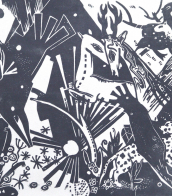

Aristotle (Greek: Ἀριστοτέλης) was an Ancient Greek philosopher and polymath, renowned for his profound impact on Western philosophy and science. Born in Stagira, Chalcidice, Aristotle's intellectual ventures spanned a multitude of subjects, including but not limited to physics, metaphysics, poetry, theater, music, logic, rhetoric, politics, government, ethics, biology, and zoology.
Educated in Plato's Academy in Athens, Aristotle distinguished himself as a scholar of vast knowledge and influence. His foundational works laid the groundwork for the development of modern science, while his teachings on logic and the syllogistic method continue to resonate in the realm of philosophy. As the tutor of Alexander the Great and the founder of the Lyceum in Athens, Aristotle's legacy extends beyond his prolific writings, with his teachings shaping medieval scholarship and influencing both Judeo-Islamic and Christian theologies.
Among Aristotle's notable works, his treatises such as "Nicomachean Ethics," "Politics," "Metaphysics," and "Poetics" have been studied for centuries. His concept of the "Golden Mean," advocating for a balanced and moderate approach to life, remains a cornerstone of ethical philosophy. His ideas on the "Prime Mover" and empirical evidence as a basis for understanding the world laid the foundation for scientific inquiry. Although only about a third of his original output has survived, Aristotle's contributions continue to be a subject of academic study and admiration.
For collectors and experts in art and antiques, the philosophical and scientific principles of Aristotle's works are not just historical artifacts but living ideas that continue to shape our understanding of the world and our place within it. His insights into the "good life" and the pursuit of happiness are as relevant today as they were in ancient Greece.
If you wish to stay informed about new product sales and auction events related to Aristotle, sign up for updates. This subscription is your gateway to the latest scholarly works, collections, and auctions connected to the great philosopher's legacy.


Marcus Tullius Cicero was a Roman statesman, lawyer, scholar, philosopher, and academic skeptic, who tried to uphold optimate principles during the political crises that led to the establishment of the Roman Empire. His extensive writings include treatises on rhetoric, philosophy and politics. He is considered one of Rome's greatest orators and prose stylists. He came from a wealthy municipal family of the Roman equestrian order, and served as consul in 63 BC.
His influence on the Latin language was immense. He wrote more than three-quarters of extant Latin literature that is known to have existed in his lifetime, and it has been said that subsequent prose was either a reaction against or a return to his style, not only in Latin but in European languages up to the 19th century. Cicero introduced into Latin the arguments of the chief schools of Hellenistic philosophy and created a Latin philosophical vocabulary with neologisms such as evidentia, humanitas, qualitas, quantitas, and essentia, distinguishing himself as a translator and philosopher.
